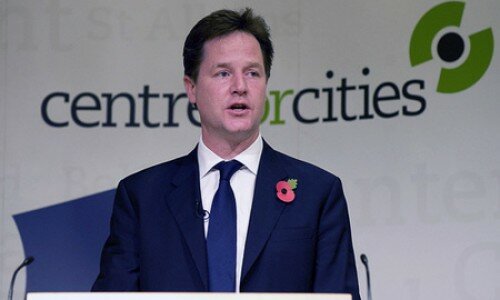
Clegg backs ‘decade of devolution’ plan for English cities
A blueprint setting out radical devolution plans for English cities and regions under beefed up councils and directly elected metro mayors has won the backing of the Deputy Prime Minister.
Nick Clegg was in Sheffield to launch .
The report says there is growing public anger at “the Westminster bubble” and the “strong sense that democracy in the UK has been captured by narrow networks of powerful but increasingly unaccountable elites”.
It warns: “A quiet storm is brewing. Public discontent with the Westminster bubble – politicians, civil servants, media, bankers – is being expressed through a collapse in political party membership, decreasing electoral turnout and the rise of the populist parties.
“A political system that has been captured by a small group of highly ‘professionalised’ politicians has led increasingly to deep political inequality in society.”
And in an indication that the Government may be moving towards a significant shift of powers from Whitehall before the General Election , Mr Clegg said such a move will be needed even if Scotland rejects independence.
A decision to grant the Scottish Parliament further devolved powers in the event of a No vote would increase pressure from the English regions and cities for a similar arrangement, Mr Clegg conceded.
He described the IPPR report as “incredibly useful” as “shifting power away from Westminster to the cities and regions has long been a priority of mine”.
The study calls for “a decade of devolution” and sets out a masterplan for a 10 year timetable to decentralise the governance of England and pass control over funding and powers held in Whitehall to the major cities and counties of England.
All but one of the biggest English cities outside London – Birmingham, Bristol, Leeds, Liverpool, Newcastle, Nottingham, Sheffield and Manchester – have lagged behind the national average GDP per capita. Only Bristol has bucked the trend, according to the IPPR report.
In Europe however, where cities and regions have greater tax-raising and spending powers, large cities have been at the forefront of economic growth.
The IPPR says additional powers must be given to Combined Authorities – groups of councils with strategic boards responsible for overseeing economic development, transport and skills. These authorities would be run by directly elected mayors.
The plan identifies 40 different functions of government which need to be devolved and covers powers and budgets held in 13 different Whitehall departments.
The report points to increasing all-party consensus over decentralisation and devolution in England and sets out proposals to devolve powers over:
• the economy
• education and skills.
• the Work Programme.
• housing.
• transport.
• criminal justice, probation and the police.
The IPPR argues for fiscal devolution to be a central plank of the 2015 Comprehensive Spending Review, with five-year funding settlements agreed and an independent body established to take forward further central-local funding reforms.
Ultimately, it argues for property taxes and business rates to be devolved to combined authorities and, eventually, a proportion of income tax to be assigned to them.
The report acknowledges the coalition government’s efforts to decentralise power – through initiatives such as the City Deal, free schools and and police and crime commissioners – and Labour’s recent calls for the creation of regional powerhouse authorities to drive growth.
“In truth, however, while the direction of travel is positive, these measures are partial and piecemeal,” says the IPPR report.
The report says all local authorities should have full control over setting council tax bills – with the power to introduce new bands – and full control over the setting of business rates.
It also calls for a review of property taxes with a view to decentralising control of them and says ten per cent of the income tax take in each of the combined authorities “should be assigned to those authorities”.
IPPR North director Ed Cox said: “Whichever way Scotland votes next week, Edinburgh will get new powers and widen the gap with local leaders across England.
“England has waited patiently while Scotland, Wales and Northern Ireland have been given ever greater devolution. Now is the time to redress the balance and devolve powers to English city-regions.
England’s 80 year experiment with centralisation has failed. It’s England’s turn for a ‘devo-more’ moment and there is a growing political consensus in Westminster on the need to answer ‘the English question’. Our plan for a decade of devolution is a practical roadmap that politicians can rally round.”
In a separate development, the leaders of some England’s biggest councils, including Manchester’s Sir Richard Leese, Liverpool’s Joe Anderson and Bristol Mayor George Ferguson, will join forces to call for regional devolution of power at a special “core cities” conference in London.
The eight core cities – which have recently added Glasgow to their ranks – will share a platform with business leaders from the CBI, Siemens, Mothercare and other leading firms.
Sir Richard said: “With the prospect of devolution looming for Scotland and Wales irrespective of the outcome of the Scottish referendum, decentralisation within England is now one of the biggest single economic issues facing government.”
Similar Articles
Time running out to get a slice of £9m Greater Birmingham housing fund 3
Developers have just one week to stake a claim for a share of a £9 million
Greater Birmingham skills coaching scheme takes 8,000 people off the dole 1
More than 8,000 unemployed people in the Greater Birmingham area have been found work in
Re-opening Moseley-Camp Hill railway a job for WMCA, say Liberal Democrats 6
Liberal Democrats are urging the new West Midlands Combined Authority to show leadership by heading
The local elections in Greater Birmingham – minus Birmingham 5
Chris Game, from the University of Birmingham's Institute of Local Government Studies, fills in the gaps
All systems go for combined authority to transform West Midlands’ economy 17
The West Midlands Combined Authority is on course to start operating in a little over










